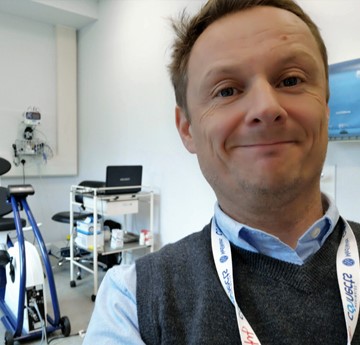Richard Bracken is professor of exercise physiology and biochemistry. He has a specialist interest in the interactions of medication, nutrition and technology around exercise in obesity and diabetes.
How did you initially become interested in your field?
I have a passion for understanding how the human body performs complex adaptions to carry out stressful activities like physical exercise. I am also still amazed that the food we consume has a dramatic impact on our energy storage and use around exercise.
My research team and I explore people with metabolic conditions like diabetes or obesity who are looking to become healthier and we explore how dysfunctions in metabolism can be overcome by improving one’s amount of physical activity and nutrition.
What are you hoping to achieve with your research?
Our research is centred around people with diabetes and / or obesity. We listen to volunteers for our research ideas and help deliver solutions that mean something to the person or healthcare profession that might benefit from them. This can take the shape of nutritional, physical activity or medication interventions.
What are you currently focusing on?
Currently I am involved in a large EU InterReg project exploring the development of healthier varieties of oats, to explore the impact of these varieties on human health.
I am also researching the usefulness of newer insulins on better blood glucose regulation in people with type 1 diabetes who look to exercise without a risk of low blood glucose concentrations, known as ‘hypoglycaemia’.
Finally, I am interested in blood glucose regulation around exercise and not only in people with diabetes, but in an athletic population as well. So we have teamed up with a high-tech US company that can record glucose continuously for weeks at a time, by means of a small sensor on the back of the arm. Such information now allows people to explore the rises and falls of glucose in response to feeding, fasting and exercise. Such information will allow the generation of healthy glucose ranges that might help prevent people from developing wide glucose fluctuations.

